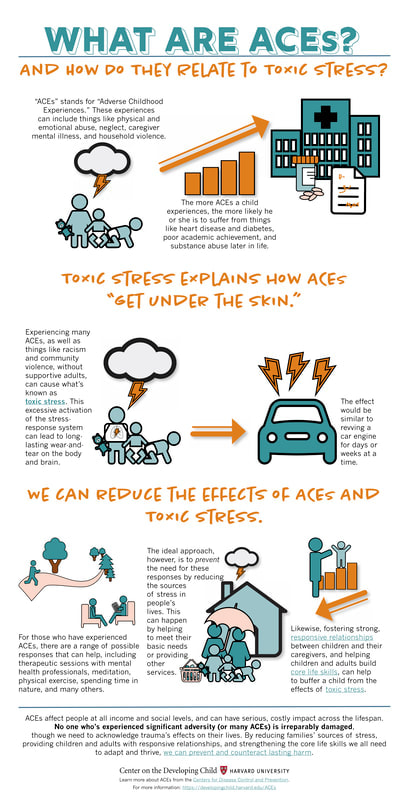|
There is no higher return on investment that that which protects the happiness and wellbeing of future generations
Across Europe and North America the long-term impact of Adverse Childhood Experiences (ACEs) on health and productivity is equivalent to 1.3 trillion dollars a year, according to a 2019 World Health Organization (WHO) co-authored paper, published in the Lancet Public Health2 . The cost is equivalent to a massive three per cent of the two regions combined Gross Domestic Product - or 1,000 dollars a year for every person in North America and Europe - and that was before the COVID pandemic. We will never create a more peaceful and sustainable world if we are simply carrying forward the patterns of the past. ACEs are the single biggest predictor of later aggression, depression, criminal behaviour, ill health and poor levels of achievement. Click here to see the Impact of ACEs |
ACEs are recurrent, stressful experiences occurring in childhood that affect a child either directly or indirectly through the environments in which they live (e.g. extreme poverty, exposure to violence or domestic abuse, parental mental illness, substance misuse or incarceration). They are often carried forward through ancestral and family patterns that recreate the same experiences - which is why it is so important that we create compassionate and trauma-aware communities.
|
Adverse Childhood Experiences (ACEs) include being a victim of child maltreatment and being exposed to poverty, domestic violence, parental alcoholism and other severe forms of stress whilst growing up. The paper estimated that as many as 319 million people aged 15 or over in Europe and 172 million in North America are currently living with a potentially health-corroding legacy of ACEs.
Lead author of the paper, Professor Mark Bellis, said “As a society, though, we all pay for failing to tackle childhood adversity through its impacts on our health services, social systems and work force. All children deserve a safe and nurturing childhood, and our findings provide economic support for this, indicating that even a moderate 10 per cent reduction in the numbers suffering ACEs could equate to annual savings of $105 billion per year.”
So the real question is not whether we can afford to invest in early childhood health and wellbeing, but whether we can afford not to
Read more
Lead author of the paper, Professor Mark Bellis, said “As a society, though, we all pay for failing to tackle childhood adversity through its impacts on our health services, social systems and work force. All children deserve a safe and nurturing childhood, and our findings provide economic support for this, indicating that even a moderate 10 per cent reduction in the numbers suffering ACEs could equate to annual savings of $105 billion per year.”
So the real question is not whether we can afford to invest in early childhood health and wellbeing, but whether we can afford not to
Read more

